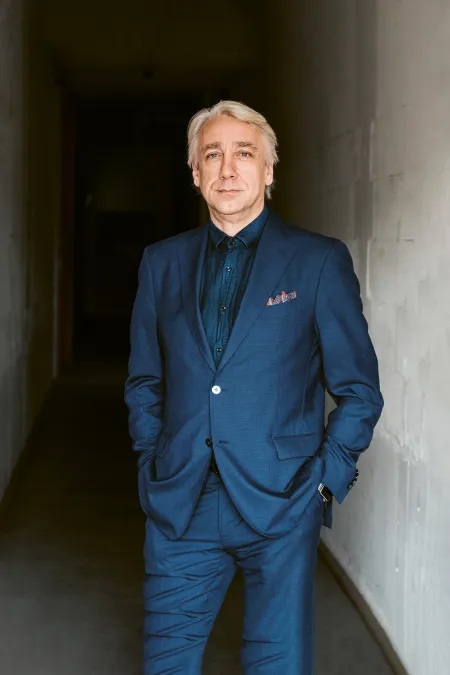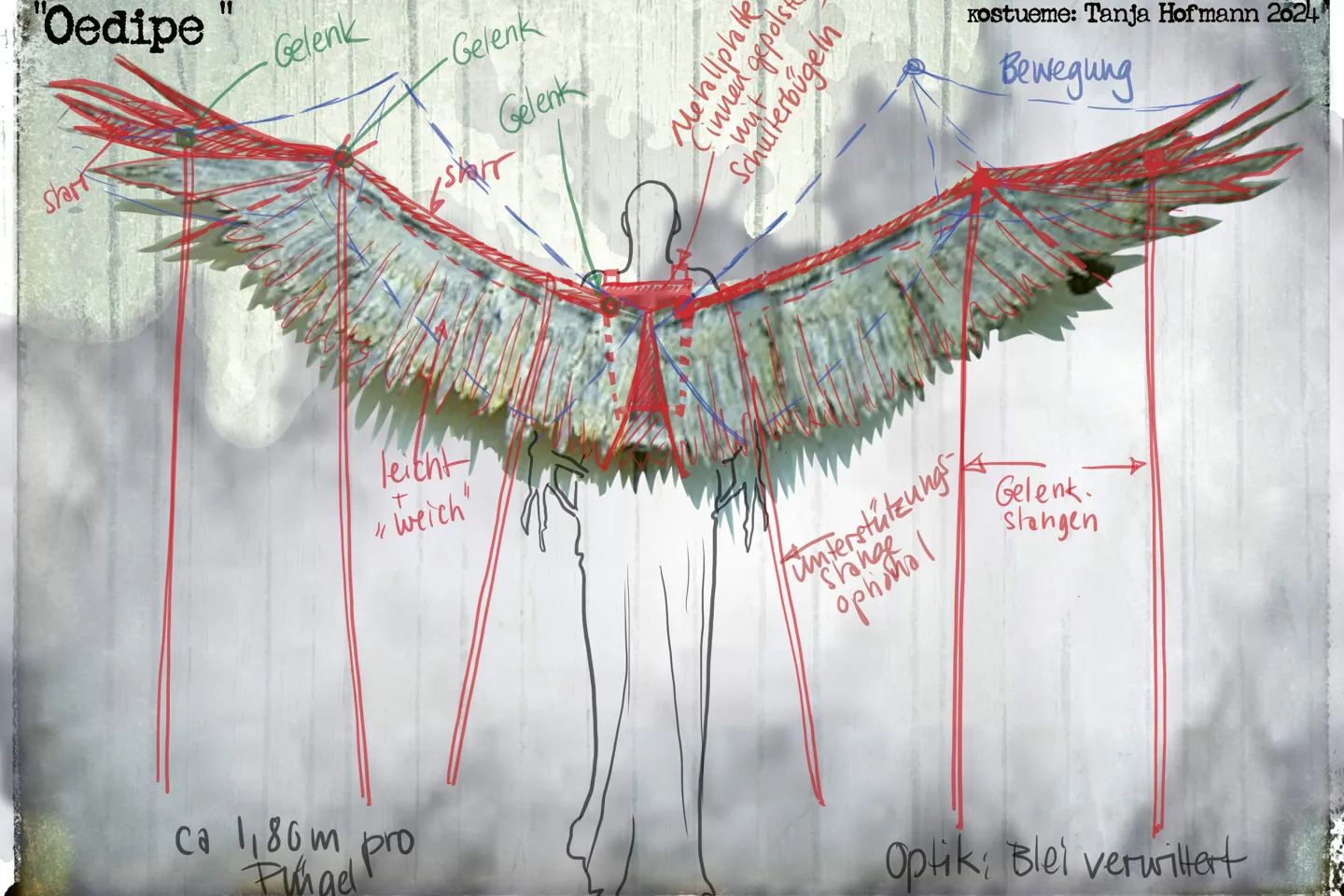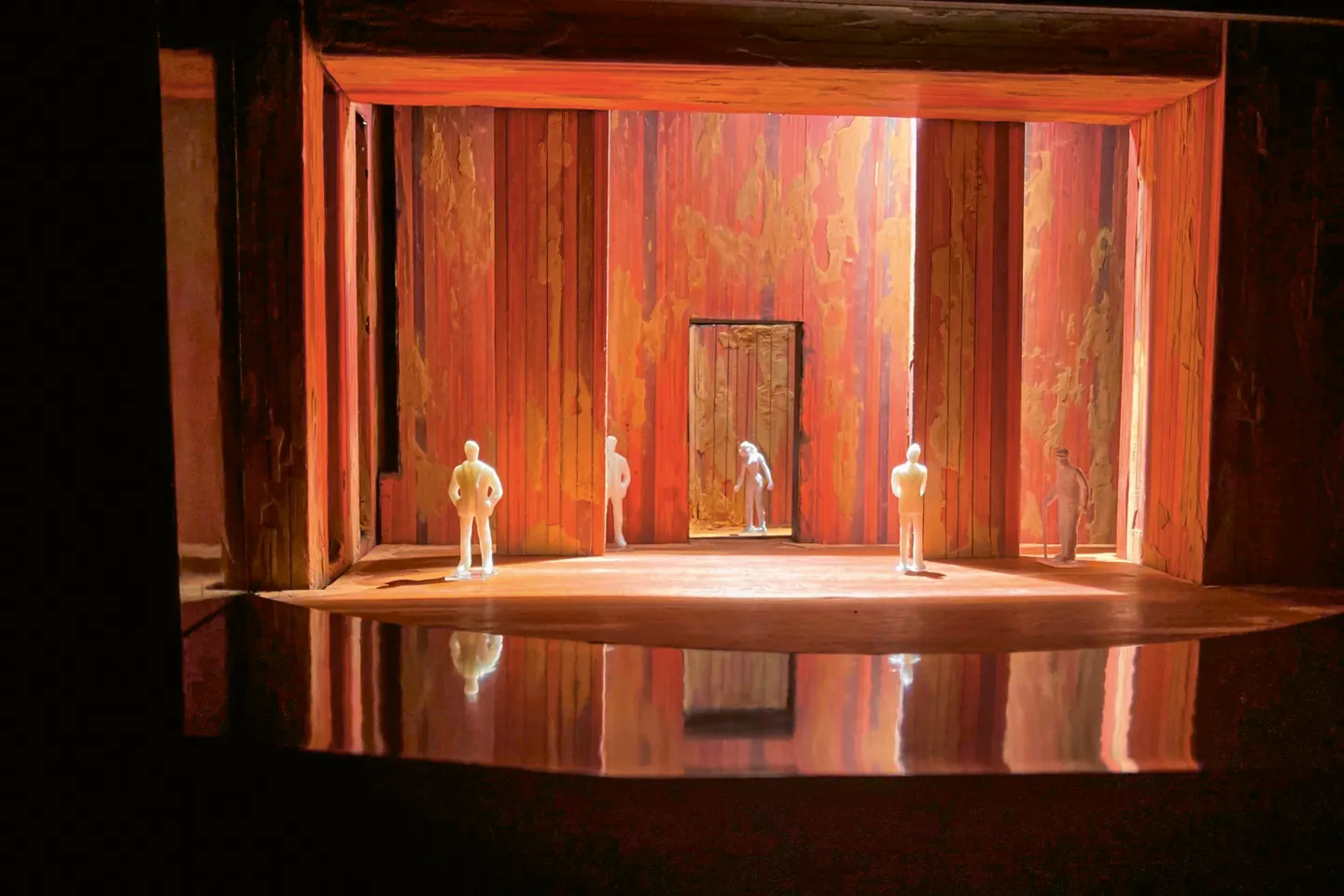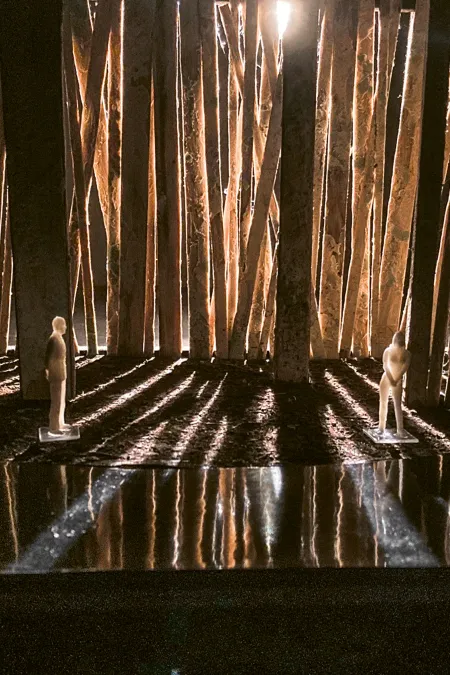Babette Karner led through the interview.
The text was published in edition 2 (03/25).
Reading time 4 Min.
„Ignorance is bliss“

He kills his father, marries his mother and, at no point, is aware of what he is doing. Oedipus’ fateful life has moved people since antiquity and opens questions about guilt, fate and responsibility. The internationally renowned director Andreas Kriegenburg stages the Bregenz version of Œdipe, the monumental choir opera by George Enescu. In an interview, he talks about the opera’s force, the power of the music – and his love for wood.
Is it healthier for us humans not to know our fate?
Andreas Kriegenburg: What’s so bitter yet so fascinating about the Oedipus story is the question, whether there actually is a chance to avoid your own fate and to look away while you head for catastrophe. Do we have to accept the inevitable? Although sometimes we wish we knew our fate, with Oedipus we learn to understand the saying: “Ignorance is bliss.” He tries to react to the Sphinx’s prophecy, to this warning about his fate, and thereby fulfils it. One of the main differences between the opera and the ancient drama, however, is that Enescu’s Œdipe answers the Sphinx’s question in so far that humans can change their fate and take responsibility.
You are a director who for many years has been successful with plays as well as opera. What do you prefer?
I like working in opera and I put a lot of emotion into it. Still, to this day, I see myself more as a director of drama, who visits opera – and in the end, is still a guest there.
Why is opera so different from theater for a director?
With a play you can concentrate and focus on the actors and actresses. In opera, however, there is the orchestra, the singers and the choir – a huge apparatus that can create strong emotions. As a director I can lean onto the music of an opera for stability and orientation: a dramaturgical and psychological guideline. In a play, I am the one who creates the emotional “composition” in my production. In opera, on the other hand, my theater background helps me to fathom the psychological highs and lows of the characters together with the singers.

Costume designer Tanja Hofmann’s design shows the impressive sphinx figure: Her silver wings, which will be moved by extras, will have a span of almost 3.5 meters.
How do you deal with the music in an opera?
My main role as an opera director is working out a scenic interpretation that establishes a sense of absolute connection to the music. The music and the scenes should intertwine, they should imperceptibly correlate with each other, so that there is basically no other way to imagine it. I’m not a director who tries to move against the music or newly interpret operas. I move along to the music.

Andreas Kriegenburg and his stage designer Harald B. Thor have assigned four worlds of colors and materials to each of the four phases of Œdipe’s life.
Enescu’s Œdipe is known for its monumental sound world and dramatic scenes. How do you translate this musical force into a visual language?
I have a very direct, authentic and uncomplicated approach to the pieces that I do. I always try to be a narrator in opera, too. I want to portray the stories very accurately and – even if they are complex or irrational – stage them in an approachable way. It’s actually not that easy with the opera Œdipe, because Enescu’s music is very concertante and oratorical and the story is very philosophical. But that’s what I like, that’s what I’m good at.
In our Bregenz version we will portray the four major phases of Œdipe’s life in individual mini dramas. To make this more understandable for the audience, we link the four acts to different elements with the help of colors and materials. In the first act, it’s the element of fire, of movement, of vividness, of fierceness. The second act is dominated by the element of water, so inconsistency, but also by fog, opacity, disorientation, and wandering. The third act, the plague in Thebes, is assigned to ash, scorched things, and the fourth act, Œdipe’s death, is characterized by wood and earth as a sign of the new beginning of a cycle.

You seem to like working with wood in your productions.
Yes, I like wood. For one, because it’s phenomenal for stage acoustics, but also because untreated, rough-cut wood makes the stage appear less artificial and reminds us of its natural origins. I also like to work with water and earth.
Were you already interested in theater as a kid?
No, it was a coincidence that I became a director. Of course I went to the theater as a child, but my family was never very passionate about the arts. I grew up in a middle-class environment with a structured upbringing but far from the world of art. I studied to become a model carpenter in a big business, but soon noticed that I wasn’t made for the pressure, the enormous regularity and the time clock. That’s when I stumbled into the world of theater, and I was lost immediately.
Before he became one of the most influential theater and opera directors of our time, Andreas Kriegenburg studied to become a carpenter at the theater of his hometown Magdeburg. Following the fall of the Berlin Wall in 1989, he left his mark as a director at the Volksbühne in Berlin, along with Frank Castorf, became director in residence at the Staatstheater Hannover, the Burgtheater in Vienna, the Thalia Theater in Hamburg and the Deutsches Theater in Berlin. His career as a director and stage designer brought him to the most important German-speaking and European theaters. Some of his productions are regarded as revolutionary and influential in terms of style: They still, to this day, influence those working in theater. Nonchalantly he moves between Weber’s Der Freischütz and Sophocles’ Antigone, between Shakespeare, Brecht and Palmetshofer.


